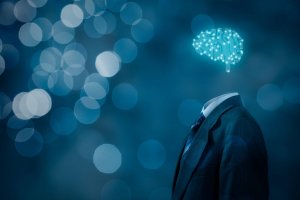Artificial Intelligence and the Future of Education


Written and verified by the teacher Azucena Fernández
Artificial intelligence is increasingly playing a role in education. The use of technology is necessary nowadays to ensure quality education.
Firstly, we have to address a basic question: what’s artificial intelligence (AI)? We can answer this question in a simple way to clarify terms.
Artificial intelligence is technology that’s aware of its surroundings and is able to carry out its tasks to maximize its chances of success. These tasks usually involve things such as planning, research, language processing, and facial recognition.
Although AI research began in 1956, nowadays, it’s more relevant than ever. From Siri and Alexa to the latest Google AI, we’re in a world destined to be increasingly shaped by artificial intelligence.
Artificial intelligence in everyday life
Smart homes and cars that drive themselves exist nowadays. Although this still isn’t within everyone’s reach, it’s real. Moreover, the impact of AI in everyday life is so widespread that, many times, we aren’t even aware that we’re interacting with it.

Think of video game characters that react and adapt to the way the user plays. This is a clear example of AI that we almost always take for granted. The same thing happens with buying predictions that show you products before you need them or Netflix movie recommendations.
Banks also use similar technologies to monitor fraud. In addition, many websites use AI for customer service. Wired, Yahoo, Fox, and Associated Press state they use artificial intelligence to create content. AI can’t replace an investigative reporter but can do simple things, such as posting sports scores.
Artificial intelligence in education
At this point, you may be asking yourself where you can find artificial intelligence in education and schools and what AI can do to change education in the future.
Today, the debate on the role of AI in schools is active on platforms such as Brainly, a social network where students collaborate. In addition, companies such as CTI are creating custom textbooks that address students’ specific needs.
Likewise, AI is already improving traditional teaching methods and correcting their deficiencies. Teachers only have a specific amount of time to interact with students but AI may be available to students 24 hours a day.
Thus, it promotes distance learning. Likewise, it can even take care of many boring administrative tasks, giving teachers more time to focus on their students.
The future of artificial intelligence in education
Yes, it’s clear that AI is here to stay. But where are we going? Innovations such as augmented, virtual, and mixed reality will play an increasingly important role in providing students a more engaging learning experience.

In this sense, it’ll also be easier to find the right resources at the right time. This way, students can customize their learning experience. AI will be able to identify areas students have more trouble with and find the right methods to improve their performance.
Regarding the question of whether teachers will eventually become unnecessary, the answer is a resounding no. The role of teachers goes beyond simply delivering information in an effective way.
While AI can be a great asset for teachers, their role is to teach students other things, not only knowledge of certain topics. For example, what their place in the world may be. They’ll help them become successful adults through knowledge. Also, they’re educated in social and emotional learning.
Only teachers can educate children to become great human beings in the future.
New generations will also need to learn social skills, self-awareness, and how to make decisions. A machine could never teach these skills.
In conclusion, although AI will be very useful in the future of education, it’ll never be useful without qualified teachers who know how to use it to their benefit and the benefit of their students.
Artificial intelligence is increasingly playing a role in education. The use of technology is necessary nowadays to ensure quality education.
Firstly, we have to address a basic question: what’s artificial intelligence (AI)? We can answer this question in a simple way to clarify terms.
Artificial intelligence is technology that’s aware of its surroundings and is able to carry out its tasks to maximize its chances of success. These tasks usually involve things such as planning, research, language processing, and facial recognition.
Although AI research began in 1956, nowadays, it’s more relevant than ever. From Siri and Alexa to the latest Google AI, we’re in a world destined to be increasingly shaped by artificial intelligence.
Artificial intelligence in everyday life
Smart homes and cars that drive themselves exist nowadays. Although this still isn’t within everyone’s reach, it’s real. Moreover, the impact of AI in everyday life is so widespread that, many times, we aren’t even aware that we’re interacting with it.

Think of video game characters that react and adapt to the way the user plays. This is a clear example of AI that we almost always take for granted. The same thing happens with buying predictions that show you products before you need them or Netflix movie recommendations.
Banks also use similar technologies to monitor fraud. In addition, many websites use AI for customer service. Wired, Yahoo, Fox, and Associated Press state they use artificial intelligence to create content. AI can’t replace an investigative reporter but can do simple things, such as posting sports scores.
Artificial intelligence in education
At this point, you may be asking yourself where you can find artificial intelligence in education and schools and what AI can do to change education in the future.
Today, the debate on the role of AI in schools is active on platforms such as Brainly, a social network where students collaborate. In addition, companies such as CTI are creating custom textbooks that address students’ specific needs.
Likewise, AI is already improving traditional teaching methods and correcting their deficiencies. Teachers only have a specific amount of time to interact with students but AI may be available to students 24 hours a day.
Thus, it promotes distance learning. Likewise, it can even take care of many boring administrative tasks, giving teachers more time to focus on their students.
The future of artificial intelligence in education
Yes, it’s clear that AI is here to stay. But where are we going? Innovations such as augmented, virtual, and mixed reality will play an increasingly important role in providing students a more engaging learning experience.

In this sense, it’ll also be easier to find the right resources at the right time. This way, students can customize their learning experience. AI will be able to identify areas students have more trouble with and find the right methods to improve their performance.
Regarding the question of whether teachers will eventually become unnecessary, the answer is a resounding no. The role of teachers goes beyond simply delivering information in an effective way.
While AI can be a great asset for teachers, their role is to teach students other things, not only knowledge of certain topics. For example, what their place in the world may be. They’ll help them become successful adults through knowledge. Also, they’re educated in social and emotional learning.
Only teachers can educate children to become great human beings in the future.
New generations will also need to learn social skills, self-awareness, and how to make decisions. A machine could never teach these skills.
In conclusion, although AI will be very useful in the future of education, it’ll never be useful without qualified teachers who know how to use it to their benefit and the benefit of their students.
This text is provided for informational purposes only and does not replace consultation with a professional. If in doubt, consult your specialist.








